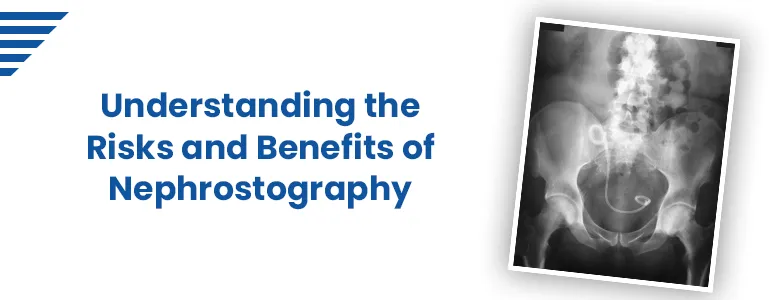Understanding the Risks and Benefits of Nephrostography

When it comes to diagnosing and treating kidney and urinary tract issues, medical imaging procedures like Nephrostography play a critical role. Nephrostography is a diagnostic technique that involves the use of contrast dye and X-rays to visualize the kidneys and urinary system. Like any medical procedure, it comes with both risks and benefits. In this blog, we'll delve into a comprehensive understanding of the risks and benefits of nephrostography.
The Benefits of Nephrostography
Accurate Diagnosis: Nephrostography allows healthcare professionals to obtain detailed images of the kidneys, renal pelvis, ureters, and bladder. This level of clarity can be instrumental in diagnosing various kidney and urinary tract conditions, including kidney stones, tumors, and blockages.
Treatment Planning: By identifying the exact location and extent of a problem, nephrostography aids in the planning of treatments. It helps surgeons determine the most appropriate surgical approach for conditions such as kidney stone removal or tumor resection.
Monitoring Kidney Function: Nephrostography can assess the functioning of the kidneys and their ability to drain urine. This is particularly important in the context of kidney transplants, where nephrostography can help evaluate graft function.
Minimally Invasive: Compared to traditional surgical exploration, nephrostography is a minimally invasive procedure. It typically requires only a small incision and offers reduced postoperative discomfort and shorter recovery times.
Home Sample Collection
The Risks Associated with Nephrostography
Allergic Reactions: Some individuals may be allergic to the contrast dye used in nephrostography. Allergic reactions can range from mild skin rashes to more severe symptoms, such as difficulty breathing. However, these reactions are relatively rare and can be managed by medical professionals.
Kidney Function Concerns: Patients with preexisting kidney issues, particularly those with reduced kidney function, are at a slightly higher risk of developing further kidney problems due to the contrast dye. Careful monitoring and hydration are essential in such cases.
Infection Risk: As with any medical procedure involving catheters or instrumentation, there is a small risk of infection. This risk is typically minimized by maintaining strict sterile conditions during the procedure.
Radiation Exposure: Nephrostography involves the use of X-rays, which expose patients to ionizing radiation. While the doses used are typically considered safe, it's important for healthcare providers to minimize radiation exposure, especially for pregnant individuals.
Mitigating Risks and Maximizing Benefits
To make the most of nephrostography while minimizing potential risks, it's crucial for patients to communicate openly with their healthcare providers. Here are some key steps to consider:
Inform Your Healthcare Provider: Share your medical history, allergies, and any existing kidney conditions with your healthcare team before the procedure.
Stay Hydrated: Adequate hydration helps flush the contrast dye from your system and can reduce the risk of kidney issues.
Discuss the Procedure: Talk to your healthcare provider about the necessity of the procedure, alternative imaging options, and the specific risks and benefits in your case.
Follow Post-Procedure Instructions: After nephrostography, adhere to any post-procedure instructions provided by your healthcare team to ensure a smooth recovery.
Conclusion
Nephrostography is a valuable tool in the diagnosis and treatment of kidney and urinary tract issues. While it does carry some inherent risks, the benefits in terms of accurate diagnosis and treatment planning often outweigh these risks. Effective communication with your healthcare provider and proper preparation can help ensure a safe and successful nephrostography procedure.
Frequently Asked Questions
What is nephrostography, and why is it used?
Nephrostography is a medical imaging procedure that uses contrast dye and X-rays to visualize the kidneys and urinary system. It is primarily used to diagnose and treat various kidney and urinary tract conditions.
What are the benefits of undergoing nephrostography?
Nephrostography provides detailed images of the kidneys and urinary system, aiding in the accurate diagnosis of conditions like kidney stones, tumors, and blockages. It also helps in treatment planning and monitoring kidney function.
Are there any risks associated with nephrostography?
Yes, there are some risks, including allergic reactions to the contrast dye, potential kidney problems in individuals with reduced kidney function, a small risk of infection, and exposure to ionizing radiation.
How common are allergic reactions to the contrast dye used in nephrostography?
Allergic reactions to the contrast dye are relatively rare but can range from mild skin reactions to more severe symptoms like difficulty breathing. Medical professionals are prepared to manage such reactions if they occur.
What precautions should individuals with preexisting kidney conditions take before undergoing nephrostography?
Patients with kidney issues should inform their healthcare providers before the procedure. Adequate hydration is often recommended to reduce the risk of kidney problems due to the contrast dye.
Is nephrostography safe for pregnant individuals?
While nephrostography uses ionizing radiation, the doses are typically considered safe. However, pregnant individuals should discuss the risks and benefits with their healthcare providers and consider alternative imaging options if possible.
Can I discuss alternatives to nephrostography with my healthcare provider?
Yes, you can and should discuss the necessity of the procedure, alternative imaging options, and the specific risks and benefits of nephrostography in your case with your healthcare provider. Open communication helps in making informed decisions.
Book Your Slot
Our Locations Near You in Hyderabad
3KM from Banjara Hills
1.9KM from Yusufguda
3KM from Madhura Nagar
5KM from Shaikpet
Profiles
- Cardiac Risk Profile
- Pituitary marker Profile
- Rheumatoid Arthritis Profile
- Dengue Fever Panel
- Lung Cancer Panel 1 Complete Molecular
- Gastroenteritis Screening Panel
- Thyroid Profile (T3,T4,TSH), Serum
- Pancreatic Marker Profile
- STD profile
- Androgen Profile
- Lipid Profile, Serum
- Pancreatic(acute)Profile
- PCOD Profile
Radiology
Pathology Tests
- Glucose Fasting (FBS),Sodium Fluoride Plasma
- Creatinine, Serum
- Glycosylated Hemoglobin (HbA1C)
- Vitamin B12 (Cyanocobalamin), Serum
- Thyroid Stimulating Hormone (TSH) Ultrasensitive, Serum
- Complete Urine Examination (CUE), Urine
- Liver Function Test (LFT),Serum
- Dengue (IgG & IgM), Serum
- Dengue Antigen (Ns1) Rapid, Serum
- C-Reactive Protein (CRP), Serum
- Widal (Slide Method), Serum
- Total IgE, Serum




